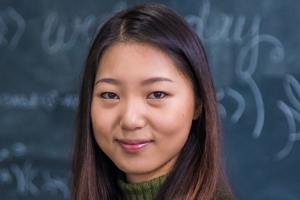Achievements
Next Steps: AU Graduate Finds Herself Through Math and Dance

Fangfei Lan is graduating this month and walking at the commencement ceremony. Yet her time at American University wasn’t just about earning a degree. It completed a road to self-actualization.
Lan took a journey across the globe, adapted to a new culture, and immersed herself in two totally different academic disciplines. She’s graduating with a double major in mathematics and computational science, but she also minored in dance.
Thanks to AP credits, Lan always planned to graduate early. But Lan—initially a business major—also learned to expect the unexpected. “I think I have a really positive attitude for these unknowns. I’m not scared about graduating. I’m not scared about leaving, or going somewhere else and exploring different things.”
Dance Steps and Proofs
Dance and math may seem incompatible, but Lan felt they reinforced each other. Most of her dance classes were earlier in the day, while her math courses tended to be in the afternoons and evenings.
“Dance got me very energized,” she says. “So I would be in a very good mood going to my math classes. It’s a good way of exercising, and I’d have good stamina because of dancing. It’s just a break from sitting at a desk all the time, and that was very helpful to me.”
Both environments were welcoming and fruitful. She could express herself, pursue her passions, and forge relationships with like-minded students. “In dance, we were constantly self-reflecting,” Lan says. “I think I built a lot of confidence through this. And dance was a very safe community. So I could make mistakes and take risks.”
A highlight was performing with the AU Dance Company in Greenberg Theatre last spring. It was a group dance, but she also had a solo portion in the performance. “I didn’t have performance anxiety or anything like that, but it was difficult. It’s not just completing a sequence, but ‘How do I find myself in that dance? How do I find my personality?’”
She appreciated the smaller class sizes in the math department. “The professors were very open to questions. I’d see them not just as professors who are very far away, but they’re people as well,” she notes.
With fellow students, she was part of the Not Math Club—which is, in fact, a math club. It was typically game-oriented and fun, discussing everyday questions like your odds of winning the lottery.
Travels and Transitions
Lan grew up in Dalian, a city in northeastern China. An early interest in dance went mostly unfulfilled when she couldn’t find studios, and she says that girls generally weren’t encouraged to study STEM fields. But her parents gave her freedom to explore and learn. She took up the Guzheng instrument and competed nationally. They also supported her English language development, bringing a British friend to the house to watch Disney movies with her.
They sent her to an international high school, with the eventual goal of college in the United States. She applied to about eight schools in the US, mostly located in rural areas. “I realized, ‘Oh my god, I don’t want to go to any of these places.’ And then I thought, ‘DC is going to be nice,’” she recalls. “So I decided to come here.”
Since this was only her second time traveling to the US, assimilation wasn’t easy. Ordering a sandwich at Subway was unfamiliar territory, and finding residence off campus can be tough for anyone. For Lan, there were additional fundamental cultural differences that took time to navigate.
“In China, people like to avoid problems a lot of times. But when I came here, I realized it’s actually more complicated if you avoid problems. It’s probably easier to just say something,” she says. “I think I gained a lot more confidence in doing these things and knowing that I am a strong woman.”
What the Future Holds
Lan gained a love of research, and she’s currently working on a project with Assistant Professor Michael Robinson on Sonar-related acoustic simulation. For next fall, she’s applying to graduate schools to earn a PhD in applied mathematics.
“I am very proud that I am a mathematician,” she says, “and I really am very determined to go further in this field.”
She’s considering research in two cutting-edge areas that could help define the future: artificial intelligence and climate studies. On the latter issue—broadly part of geoscience—she has a personal connection. Lan’s mother was in Sichuan province during the massive the 2008 earthquake that killed more than 69,000 people. Her mother escaped, but Lan is still curious about solutions to cataclysmic natural disasters. “I was very young, but I’ve always thought, ‘Why couldn’t we predict anything about these things? Why can’t we give any precautions and tell people to evacuate?’”
She’ll likely choose her research focus two years into graduate school. And like many aspects of her life, she’s open to whatever comes next.
